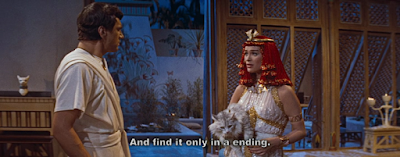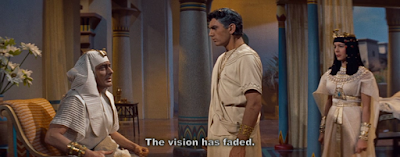I return to
The Egyptian, as it may be the most baldly liberal-humanist, existentialist talking-point-filled, exegetical-of-humanity, naive and immoderate screed against the recurring patterns of a social and conflict-based world I have seen in classical cinema. It is distinguished not for Michael Curtiz's semi-mastery over moving master shots or his clear-eyed classicism, nor for his impersonality and mere journeyman sense of craft. It is not distinguished for any sort of imposing style, but for another sort of content-form relationship in which the two mirror each other perfectly (via evenly matched sense of comprehension), in which neither are defined by bold style or personality, or even poetry, but by the force of the story's historicizing of the story of humanism, which is a history of philosophy, which is an imperative storytelling that requires neither self-styling nor personality, and which is a story of warring nascent philosophies intertwined in praxis with the history of the human race (by way of the Hegelian
"State," the social and political structure through which the subjective experience of human individuals are unified and given consequence). Curtiz merely needs to sublimate his formally classicist practices within the imperative with which he understands his survey of human history that he is taking on (through focusing on one particular time in history, pre-Axial Age, in which critical philosophy was only being imagined and human philosophy in general constantly conjectured adjacent with the primitive formation of world order through ancient warring civilizations).
The Egyptian then, in its encompassing nature, is a great piece of historicizing, not because it is a historical story, but because it is a story formed around the flux of philosophical history. Idealism, pragmatism, nihilism, materialism, warism and pacifism are all contained here, and the film is about the battle between these philosophies that not only define this particular period of time, but are actually the general and fundamental components of all time. This is a film and story about all time, and, as a film, Curtiz (the designator of the "form") has only to step back and show his comprehension of it (the story, the designator of "content"), which he does, and so is responsible for a truly purposeful picture of the "distinction" I alluded to formerly: a film that repurposes/purposes our philosophical history. The fact that Hooper singled this picture out as one of his favorite films (mentioning it along with Vincente Minnelli's
The Cobweb, a dazzling one-two combo of taste) is simply another sign that Hooper himself has similar motivations with his art: to create a history, neutrally, philosophically, through unitary - unified but still based on "units" - works of film, films which examine independently a piece of humanity, and, in a continuum (as one conformed unit), depict all the filmmaker's beliefs and observations of humanity, which, in tandem, maps out philosophy and a world bound by change. This, over all, is the most important or commendable aspect of auteurism: that, when viewed as a continuity, an oeuvre can depict the world and a history of the world. What
The Egyptian does in a film is what Hooper does in a career. From
Eaten Alive to
The Funhouse to
Djinn, what we can see is uniformly forlorn depictions of a race committed to suffering experiences of violence, to experiences of modernity, to culture and Freudian psychology of the Ego and Id, underlined by a survey of the philosophy which exists to help understand our suffering.
Eaten Alive's nihilism melds to
The Funhouse's critical postmodernism, and ends, appropriately, with
Djinn's ultra-modern depiction of materialism and humans' relation to "thingness." All his films previously - in their chaos, yet tied to a realism - lead up to this point.
State underlines every one of his pictures, in their diversity, in the unity of their diversity, as
State is always in flux and the history of the world is partly described by the history of its people and their intersections with the state and philosophy. Hooper's pragmatism imbues back into his scope the material, the minutiae, the "thingness" occurring when our societal modes of production break down - in this sense, Hooper is the William Carlos Williams of filmmakers.
The Egyptian succeeds in ways that a typical Curtiz film would often struggle with, for he is not one of cinema's foremost masters of the transcendent. It is only with
The Egyptian that his cinema of politics reaches so otherworldly a degree, and this, again, is on the level of a philosophical history being provided.
"So the young physician is still asking 'why?'" are the words out of the simple barmaid's mouth, directed at the learned man she is smitten with, and so we see the intersection of the personal and the philosophical, backgrounded by the
State, as he will continue asking such questions, and she will continue asking such questions of him, even as he becomes physician to the Pharaoh.
The Egyptian
is powerful for its plainness and
plainspokenness, essentially made out of set-pieces of talking and, of course, questioning. That is the backbone of philosophy after all. Where Curtiz's
Casablanca is essentially made out of soliloquies of love,
The Egyptian constitutes itself out of scenes of moral questioning. So it is seen here, in which one, simple unequivocal statement (or query) completely turns the course of a drama:
I will leave the rest of these pieces of dialogue to speak for themselves, mostly, with the reserved right to elaborate further in future posts what I determine has been left vague and undefined. But these dialogue bits I find are ones of potent moralism and radical essentialism. They should speak powerfully all by themselves. Sinuhe's (Edmund Purdom) courtship of Nefer (Bella Darvi), which I depict below in a selection of dialogues, is one of the most striking sections of the film, for me, as it presents an entirely complex depiction of the conspiratorial female, one who less manipulates so much as she philosophizes, who deceives less than she does define the parameters of deception.
* * *
* * *
Even the great Hittite warrior speaks in historicized terms, philosophizing his own war campaign and looking at it from a point far in the future.
There is wisdom even under the soldier Horemheb's cynical terms (played by Victor Mature). Underneath his grim analysis is a historiography of war, a way of representing and recording war that helps his agenda.
* * *
* * *
* * *
* * *
* * *
I commend the picture for depicting a sort of proto-atheism in the character of Sinuhe, who during the course of the picture becomes so cynical he comes to reject all gods and kings, but the Christianity of the source material's author, Mika Waltari, and a tendency of the film itself to succumb to Hollywood formula of religious dogmatism (as they cater to a Christian populace), drag the picture down. A moral simplicity peaks through in some scenes following common narrative etiquette, such as the scene depicting the comeuppance of Nefer, who returns to Sinuhe years after she had ruined and disgraced him, now struck with a sickness due to her dissolute, sexual lifestyle and that has ravaged her beauty forever. He helps her and sends her away, then claims: "A cat can't help what it is." Only Sinuhe need not proclaim a thing so spitefully and with such propriety, when she was the one who told him that exact same thing earlier in the film.
The film ends with a final title card prophesying the time of Christ, which unfortunately underlines the film's narratively contrived pro-monotheism theme, an anachronistic moral framework that simply abides religious conservatism. This mainstream indoctrination is somewhat betrayed in the last two scenes I have screen-capped: above where the Pharoah Akhnaton waxes on about the enlightenment found in his one true God - symbolized fatuously by the Ankh, a clear screenwriter substitution for the crucifix - and below where Sinuhe speaks of a "thought that lives," one can presume being implied is the teachings of Christ. But in spite of these strictures and habits of the system, Curtiz, a Jewish-born man, had created a film that most predominantly expounds his rationalist, ethical beliefs about the world in a truly breathless and emphatic stream, such that it is not hard to get caught up in
The Egyptian and its tour of humanist thought.




































































No comments:
Post a Comment